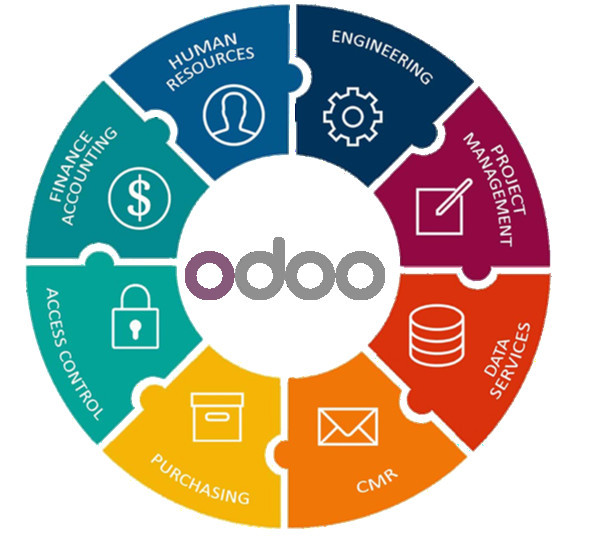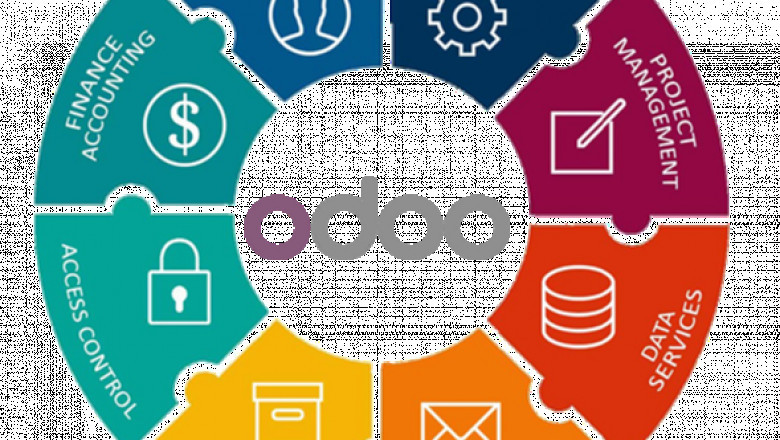views

What is Odoo?
Odoo is a comprehensive, open-source ERP system that offers a wide range of integrated business applications. From accounting, inventory, and sales to CRM, HR, and marketing, Odoo provides a modular approach, allowing businesses to customize their ERP solution based on their unique requirements.
Originally launched as TinyERP in 2005 and later renamed OpenERP, Odoo has evolved into a widely used business management suite. Today, it serves millions of users worldwide, offering both a free Community Edition and a paid Enterprise Edition with additional features and support.
Key Features of Odoo
1. Modular and Scalable
Odoo’s modular structure enables businesses to start with essential applications and expand as they grow. Whether you are a startup or a large enterprise, Odoo adapts to your needs. Companies can implement specific modules like accounting, inventory, or project management and integrate additional functionalities over time.
2. User-Friendly Interface
Unlike many complex ERP systems, Odoo is known for its intuitive and easy-to-use interface, ensuring a smooth learning curve for employees. Its modern and responsive design enhances accessibility across various devices, allowing users to work seamlessly from desktops, tablets, or smartphones.
3. Customization and Flexibility
As an open-source platform, Odoo allows businesses to tailor their ERP system to their specific needs, making it a highly flexible and customizable solution. Companies can develop custom modules, modify workflows, and integrate third-party applications to optimize operations.
4. Cost-Effective Solution
Traditional ERP solutions can be expensive. Odoo offers an affordable alternative without compromising on functionality, making it accessible for small and medium-sized businesses. The free Community Edition provides essential features, while the Enterprise Edition offers advanced tools and dedicated support at a competitive price.
5. Seamless Integration
Odoo integrates seamlessly with third-party applications, ensuring smooth data flow across various business functions. Popular integrations include payment gateways, eCommerce platforms, shipping services, and cloud storage providers, enhancing operational efficiency.
6. Comprehensive Business Management
Odoo covers a broad spectrum of business functions, including:
-
Accounting & Finance: Automated invoicing, bank reconciliation, financial reports
-
Inventory Management: Real-time stock tracking, warehouse management, procurement
-
Sales & CRM: Customer relationship management, lead tracking, sales pipeline automation
-
HR & Payroll: Employee management, payroll processing, recruitment
-
Project Management: Task scheduling, team collaboration, performance tracking
-
eCommerce & Marketing: Website building, digital marketing tools, SEO optimization
Why Choose Odoo Over Other ERP Systems?
1. Open-Source Advantage
Unlike proprietary ERPs, Odoo offers transparency, community support, and continuous improvements. The open-source nature allows developers worldwide to contribute enhancements, ensuring Odoo remains updated with the latest industry trends.
2. All-in-One Platform
From sales and inventory management to project management and HR, Odoo provides everything under one roof. Businesses don’t have to rely on multiple software solutions, reducing operational complexity and costs.
3. Cloud and On-Premise Deployment
Businesses can choose between cloud-based or on-premise installations based on their preferences. Odoo’s cloud-hosted version offers hassle-free updates and maintenance, while on-premise deployment ensures full control over data security.
4. Active Community and Support
With a vast global community, Odoo continuously evolves with regular updates and enhancements. Users can access extensive documentation, forums, and third-party service providers for assistance and custom development.
Implementing Odoo in Your Business
Step 1: Identify Business Needs
Before implementing Odoo, businesses should analyze their requirements and determine which modules best fit their operations. A needs assessment will help in selecting the right combination of features.
Step 2: Choose the Right Version
Odoo offers a Community Edition (free) and an Enterprise Edition (paid). While the Community Edition provides essential functionalities, the Enterprise Edition includes advanced features, support, and security enhancements.
Step 3: Customization and Integration
Since Odoo is highly customizable, businesses can work with developers to tailor the system to their specific needs. Integration with third-party applications ensures seamless business operations.
Step 4: Training and Adoption
Employee training is crucial for successful implementation. Odoo’s intuitive interface simplifies adoption, but providing hands-on training and documentation ensures a smoother transition.
Step 5: Continuous Improvement
ERP implementation is an ongoing process. Businesses should regularly evaluate their system’s performance, update modules as needed, and stay engaged with the Odoo community for the latest developments.
Conclusion
For businesses looking for a scalable, cost-effective, and feature-rich ERP solution, Odoo is an excellent choice. Its open-source nature, combined with a vast range of business applications, makes it a preferred ERP system for organizations worldwide. Whether you are a small business or a large enterprise, Odoo provides the tools you need to optimize operations and drive growth.
Are you considering implementing an ERP system? Odoo might be the perfect solution for you! 🚀
Let’s connect and discuss how Odoo can transform your business operations. Feel free to share your thoughts in the comments! 👇






















Comments
0 comment